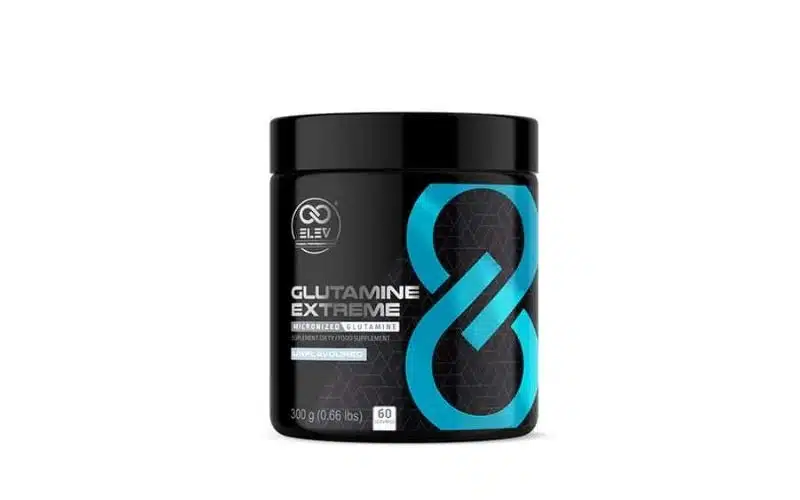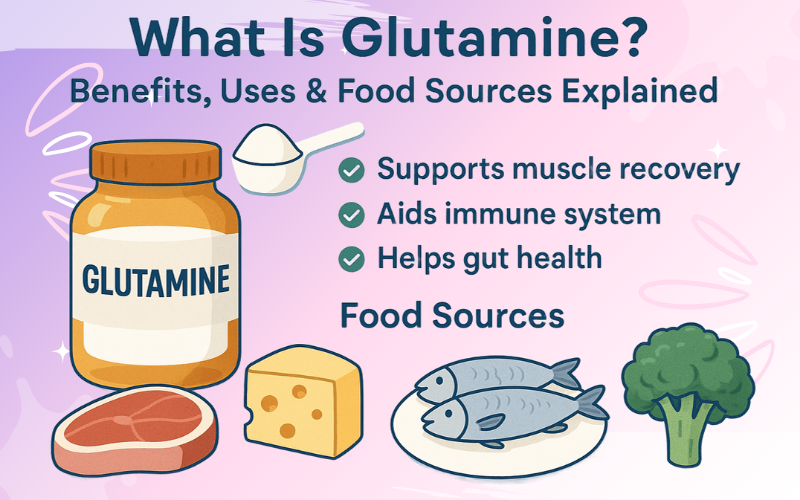No products in the cart.
Return To ShopWhat Is Glutamine? Benefits, Uses & Food Sources Explained
What is glutamine and why is it important? Learn about its benefits for muscle recovery, gut health, immunity, and food sources. Backed by science.
Whether you’re a bodybuilder, a patient recovering from surgery, or simply someone looking to improve gut health, you may have come across the term glutamine. But what is glutamine, really and why is it gaining popularity in the world of nutrition and functional medicine?
Glutamine is more than just another amino acid. It plays a crucial role in muscle growth, immune function, and intestinal health. From athletes to people managing chronic conditions, glutamine has emerged as a go-to supplement for enhancing recovery and resilience.
Let’s break it down.

What Is Glutamine?
Glutamine is a conditionally essential amino acid, meaning your body can usually make enough of it except during times of extreme stress, trauma, or illness.
It is the most abundant amino acid in your body, especially in muscle tissue and blood. Glutamine supports:
- Protein synthesis (muscle building)
- Immune cell function
- Intestinal barrier health
- Nitrogen transport in cells
Under normal conditions, your body produces enough glutamine naturally. However, during physical stress (like surgery, infection, or intense exercise), your body’s demand may outpace its supply.
What Are the Types of Glutamine?

There are two main forms of glutamine:
✅ L-Glutamine
This is the biologically active form found in food and used in supplements. It’s the form your body uses for metabolic functions, healing, and recovery.
✅ D-Glutamine
This form is structurally different and not commonly used in human biology or supplementation.
When people refer to glutamine in health or fitness, they almost always mean L-glutamine.
What Does Glutamine Do for Your Body?
Glutamine supports multiple physiological functions. Here’s how it helps:
💪 Muscle Recovery
Glutamine is stored in muscles and helps reduce soreness and muscle breakdown post-workout. It improves recovery and promotes lean muscle preservation during calorie deficit or illness.
🛡️ Immune Support
It acts as fuel for white blood cells and immune-regulating cells in the gut. When you’re sick or injured, your immune system rapidly consumes glutamine.
🧠 Gut Health
Glutamine is the primary fuel for intestinal cells, helping maintain a healthy gut lining. It can reduce intestinal permeability (“leaky gut”) and improve conditions like IBS.
⚡ Metabolism & Energy
Glutamine helps balance nitrogen transport in your body and is used in energy production, especially in stress or trauma.
What Are Good Food Sources of Glutamine?
Your body gets most of its glutamine from protein-rich foods. Here’s a list of top dietary sources:
| Food | Glutamine Content (approx.) |
| Beef | High |
| Chicken | High |
| Eggs | Moderate |
| Fish (salmon, tuna) | Moderate |
| Milk & Yogurt | Moderate |
| Cabbage | High (for plant source) |
| Beans & Lentils | Moderate |
| Spinach | Good source |
Note: Cooking can slightly reduce the glutamine content, especially in vegetables.
What Is Glutamine Used For?
Glutamine has both clinical and athletic uses. Here are the most well-researched applications:
🏋️ Fitness & Muscle Gain
- Enhances post-exercise muscle recovery
- Prevents muscle catabolism in endurance athletes
- Useful during cutting or heavy training phases
🦠 Gut & Digestive Health
- Helps in managing IBS, leaky gut syndrome, and colitis
- Supports gut lining integrity, reducing inflammation and bloating
✅ Sickle Cell Disease
L-glutamine is FDA-approved (as Endari®) to reduce complications in people with sickle cell anemia. It helps by reducing oxidative stress and frequency of pain crises.
✅ Burns or Injuries
Glutamine supplementation is often used in hospitals for patients with severe burns or traumatic injuries. It helps improve healing, reduce infection rates, and support immune defense during recovery.
Who Should Supplement With Glutamine?
Glutamine supplementation may benefit:
- Athletes with intense training loads
- Individuals recovering from surgery, injury, or infection
- People with gastrointestinal disorders (e.g., IBS, leaky gut)
- Those with autoimmune or chronic inflammatory conditions
- Patients undergoing chemotherapy or radiation
For healthy individuals, diet is usually sufficient unless under stress or medical care.
How Much Glutamine Do You Need Daily?
There is no official RDA (Recommended Daily Allowance) for glutamine, but typical usage is:
- From diet: ~3–6g/day
- Supplement dosage:
- General health: 5g/day
- Post-workout: 5–10g/day
- Medical use (under supervision): up to 30g/day
- General health: 5g/day
Always consult a healthcare provider before high-dose use.
Is Glutamine Safe? Side Effects & Warnings
L-glutamine is generally safe for most people when taken at standard doses.
Possible Side Effects:
- Nausea or upset stomach
- Bloating or gas
- Headache in rare cases
Cautions:
- Avoid people with liver disease, kidney issues, or seizure disorders unless under medical guidance.
- May interact with chemotherapy drugs, anticonvulsants, or immunosuppressants.
What Does Research Say?
Multiple clinical studies show glutamine helps with:
- Post-surgery immune strength
- Gut permeability reduction
- Exercise-induced muscle damage recovery

However, more large-scale human studies are needed to confirm long-term effects in healthy populations.
Conclusion
Glutamine is a versatile and vital amino acid that plays a key role in muscle growth, immunity, and gut function. While your body produces some on its own, stress, illness, and intense exercise can deplete levels making supplementation helpful for certain individuals.
Whether you’re an athlete looking to recover faster or managing a health condition, glutamine may offer meaningful benefits when used correctly.
✅ Ready to support your recovery and immunity? Shop premium L-glutamine supplements now at SportsOne →
Frequently Asked Questions (FAQs)
❓ What is glutamine used for?
Glutamine is used to support muscle recovery, gut health, immune function, and as a treatment for sickle cell anemia and burns.
❓ Is glutamine good for the gut?
Yes, glutamine fuels intestinal cells and helps repair the gut lining, making it useful for IBS, leaky gut, and general digestive health.
❓ Is glutamine safe for daily use?
Glutamine is safe in normal doses (5–10g/day), but consult your doctor if you have chronic medical conditions.
❓ What foods are rich in glutamine?
Top sources include beef, chicken, eggs, dairy, cabbage, beans, and spinach.
❓ Should athletes take glutamine supplements?
Yes, especially if undergoing intense training or dieting, as it helps prevent muscle breakdown and speeds up recovery.









Add comment